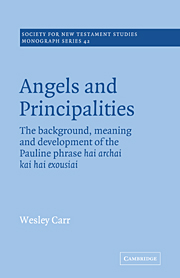 Angels and Principalities
Angels and Principalities Book contents
- Frontmatter
- Contents
- Preface
- Abbreviations
- General Introduction
- PART 1 The Background to Paul's Thought on the Powers
- PART 2 Exegesis of Pauline Texts
- PART 3 The post-Pauline development
- 6 Texts within the New Testament
- 7 Ignatius of Antioch
- 8 The angelomorphic Christology of early Jewish Christianity
- 9 The Greek apologists
- 10 Clement of Alexandria
- 11 The influence of gnosticism
- 12 Origen
- Conclusion to Part 3
- PART 4 Final Remarks
- Notes
- Select Bibliography
- Index
- Frontmatter
- Contents
- Preface
- Abbreviations
- General Introduction
- PART 1 The Background to Paul's Thought on the Powers
- PART 2 Exegesis of Pauline Texts
- PART 3 The post-Pauline development
- 6 Texts within the New Testament
- 7 Ignatius of Antioch
- 8 The angelomorphic Christology of early Jewish Christianity
- 9 The Greek apologists
- 10 Clement of Alexandria
- 11 The influence of gnosticism
- 12 Origen
- Conclusion to Part 3
- PART 4 Final Remarks
- Notes
- Select Bibliography
- Index
Summary
Origen, the final writer to be considered in this survey, represents a major turning point in the history of Christian thinking, not least on the question of angels, demons and powers. On the one hand, he stood firmly in the tradition of his predecessors. He succeeded Clement at Alexandria and he shows familiarity with the Judaeo-Christian tradition. He was also a careful interpreter of Paul. On the other hand, it may also be claimed that much Christian thought after him was dependent upon his interpretations and innovations.
There are many references to angels and demons in his work, and everywhere we find a systematic presentation of their status and functions. Along with questions of Christ and the Holy Spirit, they are among the ‘magna et maxima’ of the faith. Important as they are for the believer, their significance too for the unbeliever is emphasised by their prominence in Celsus’ attack on Christianity. Angels are ministers of God, both towards men and from men to God (de princ. 1.8.1; contra Cels. 5.4f). The list in Col. 1: 16 is taken to refer to angelic beings. Fundamental is the concept of ‘naturae rationabiles’ (de princ. 1.5), which is Origen's means of systematising all beings, angelic, demonic and human, to create a synthesis that is most important in his interpretation of Col. 2:15. When he expounds Col. 1: 16 all terms refer to holy angels.
- Type
- Chapter
- Information
- Angels and PrincipalitiesThe Background, Meaning and Development of the Pauline Phrase hai archai kai hai exousiai, pp. 168 - 171Publisher: Cambridge University PressPrint publication year: 1981
